Chinese fishing vessel fleet © The Maritime Executive
“And God said, let us make man in our image, after our likeness: and let them have dominion over the fish of the sea.” That’s what it says in the Bible, in the book of Genesis. The Qur’an also talks enthusiastically about fish and fishing, such as in the Book of Ezekiel, Chapter 47, verse 10: “Fishermen will stand along the shore; from En Gedi to En Eglaim there will be places for spreading nets. The fish will be of many kinds like the fish of the Great Sea.” Fish were clearly very important to our ancestors (not just the prophets) as a vital source of food. In many parts of the world, they still are, whatever religious faith the locals happen to practise. Where I was brought up, along the banks of the River Tyne in North-East England, fishing was a very important industry and, as a child, I loved to see the seine netters, drifters, trawlers, and other boats chugging back up the River Tyne to the Fish Quay with their harvest. Relying on the sea for a living is (and always has been) a hazardous business, strewn with dangers. In December 1938 a small steam-powered trawler called the Jeanie Stewart sailed out of North Shields, on the north bank of the Tyne, intending to return to port later that same year, on Christmas Eve, the 24th of December. She and her 9-man crew were never seen again, and nor has any wreckage ever been found, despite searches being made right up the east coast of Scotland, although a life raft that turned up the following spring could have come from the vessel; it was unmarked so no-one could tell for sure.
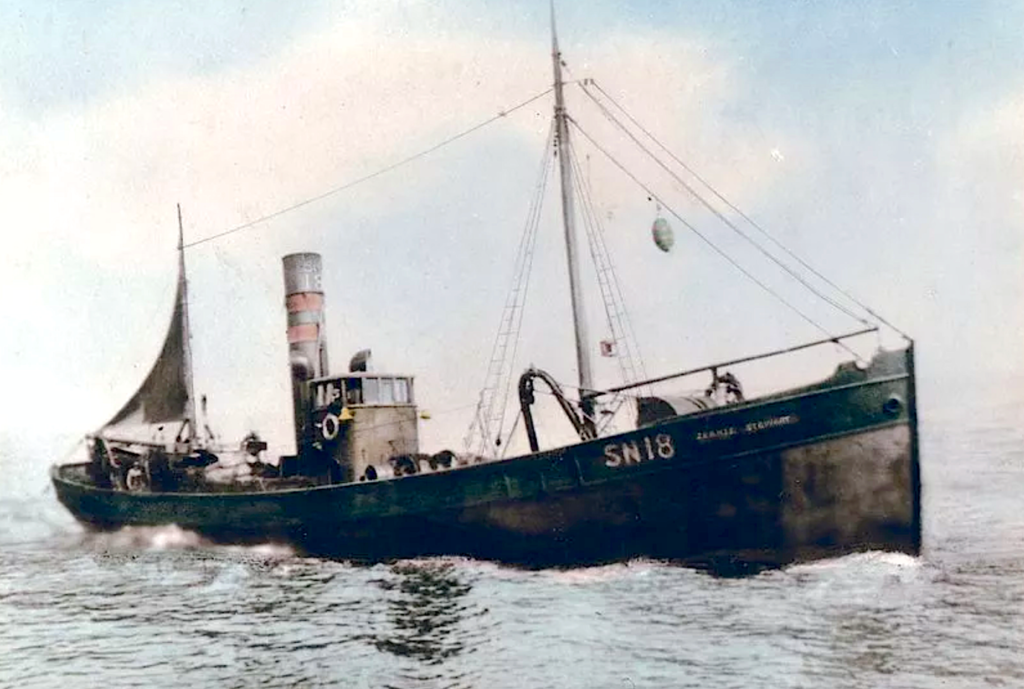
North Shields had a long history as a fishing port and even today it is England’s largest port for landing prawns. The ships we most looked forward to seeing when I was a boy were the enormous Southern Harvester and Southern Venturer. The Harvester is believed to be still docked at Aruba to this day. They were never seen together because they took turns on their missions, but they were whaling ships that mainly hunted in the southern hemisphere. Both vessels stank strongly, probably of dead whales. Back in those far-off days we didn’t realise how wrong it was to hunt whales, so we admired the big harpoon guns mounted on the deck. It gave an extra frisson to the Walt Disney film of Jules Verne’s 1870 novel about a rogue Captain, Nemo, with his submarine called “Nautilus”. The harpoonist in the book (and film), called Ned Land, was played by Kirk Douglas in the movie, but Disney did somewhat redesign the Nautilus so that it looked very different (and rather more ominously animalistic) than it had in Jules Verne’s description. Still, my fellow junior school pals and I loved the book and the film, even if we didn’t like the smell the two whaling ships gave off on the days the westerly wind brought it over our school.
The English North-East seems less likely to face devastation because of Chinese over-fishing than the ports of southeast Asia, whatever the Bible and the Qur’an may say. In the People’s Republic, the concern is not so much for prophets as for profits, anyway. China stands accused of seriously overfishing the waters of Southeast Asia and the entire surrounding area. The world’s fisheries are said to be in crisis, with some observers accusing China of deliberately over-fishing to help fund the increased construction of long-range trawlers and also providing fleets with equipment to predict fish movements so that no fishing effort is wasted. Meanwhile, China is said to be adversely impacting on the marine environment in many parts of the world through plastic pollution, the destruction of forests and through emitting greenhouse gases on a massive scale.

China consumes one third of all the fish caught throughout the world, with a per capita annual consumption of some 38 kilos, which is many times as much as most developing and even highly developed countries, including the United States. Hong Kong consumes spectacular volumes, too: some 70 kilos per person per year and almost three times the volume consumed even in the USA. As people used to say, there’s clearly something fishy going on! Almost 40% of the wild-caught fish eaten in China come from imports, including two thirds of the fish consumed in Hong Kong. That includes threatened species, eaten without consideration for the fishes’ survival. Expert observers note that it’s very difficult to monitor fish catches and consumption in China because it deliberately seeks to obscure what it’s doing. It is soundly believed, however, that China is certainly the biggest consumer of marine life. It’s said to be the world’s largest consumer as well as being the largest producer and exporter of fish, as well as the third largest importer.
| MORE AND MORE, BUT SMALLER
The dishonesty of the Chinese government over its fishing activities has drawn strong criticism from the Hong Kong Free Press. “The Chinese government promotes overfishing around the world,” ran one article written by Paul G. Harris, “by helping to pay for the building of large long-range trawlers, providing fleets with forecasts of where and when certain species are likely to be most prevalent around the world, and providing tax exemptions and extensive subsidies, especially for fuel.” All of this has provided the background music for a massive growth in China’s piscatorial activities, which continue unabated despite the rapid declines in fish stocks worldwide. China’s fisheries production rose substantially in the 1970s and the trade accelerated in the 1990s. China is known to under-report its fish catches, because it’s certain to catch more fish than any other country, and probably at least 15% of the global total. For some species, its take is even greater, and it’s said to be responsible for almost 70% of the total catches of squid. As a result of all this energetic exploitation of available marine life, the coastal waters of the South China Sea have witnessed a 90% reduction in biomass, despite the Chinese government’s declared moratoria of summer fishing.
The fish that remain, when they’re caught at all, are said to be a fraction of the size of their forebears, making them unfit for human consumption.
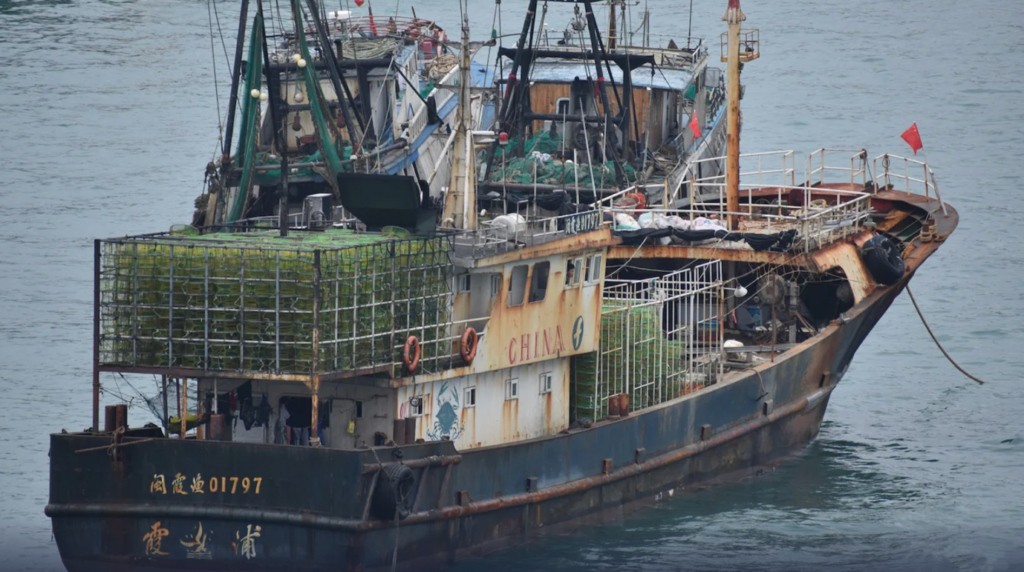
They are still harvested, however, as food for China’s aquaculture industry. If you’re breeding fish on a commercial scale they need to eat, too. By the way, China can now boast some 17,000 fishing vessels – a big increase on the 13 it owned in 1985. The US can only boast a distant-water fleet of fewer than 300 vessels. The effect of China’s seemingly insatiable appetite for seafood, largely through funding the construction of long-range boats, has so affected fisheries elsewhere in the world that one assessment concluded that “no major global fishery ecosystem is untouched by China’s seafood economy.” I would never have imagined such a thing when queuing for a piece of deep-fried cod and six penneth of chips (a slice of battered and deep-fried cod together with a portion of chips to the value of six old pre-decimalisation pennies and all wrapped up in newspaper) in Coleman’s, my nearest fish-and-chip shop, all those many years ago.
There is another issue that would never have been raised in that old chip shop: sharks’ fins. It’s illegal to hunt them but China regularly ignores the law to meet demand, which is why shark populations worldwide are tumbling. Apart from the devastating effect on the shark population, it devastates stocks of the totoaba, an increasingly rare species found only in Mexico’s Sea of Cortez, because of the demand for the poor creature’s swim bladder, which is used (for no known medical reason) in Chinese traditional medicine. The bladder of just one fish can fetch US$100,000. Sadly, this leads to the drowning of vaquita porpoises, which are now nearing extinction. Some estimates suggest that only half a dozen or so remain alive. What’s more, many of China’s fishing vessels are bottom trawlers, which China has banned from its own waters because of the massive damage they cause, but which are still used where the law is harder to apply. Vessels from China and from Hong Kong (where bottom trawling is also banned) are responsible, it’s said, for more than 25% of fish caught using this very destructive method.
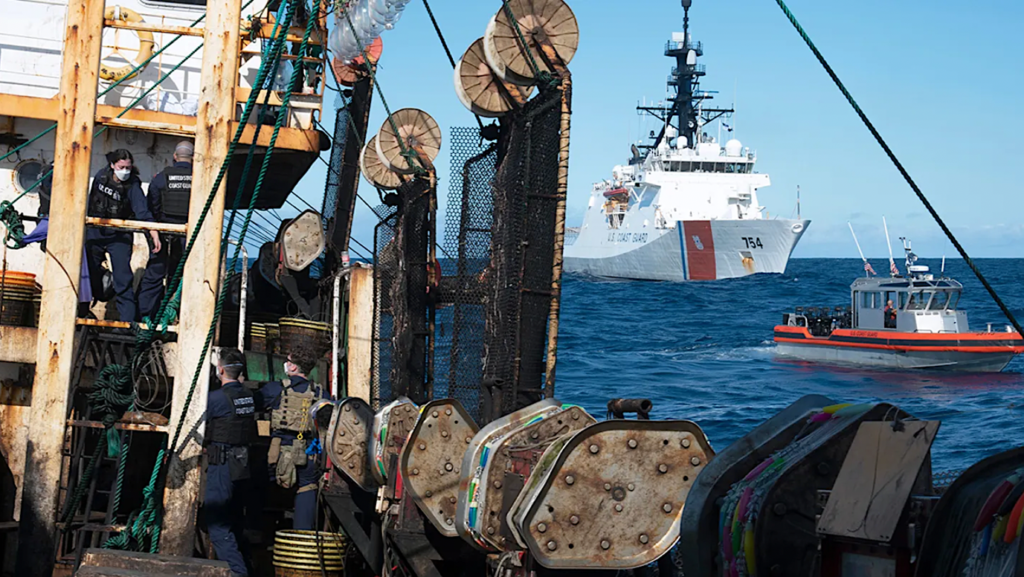
In fact, China is thought to be the very worst source of illegal and unreported (or deliberately misreported) fishing activity, conducted in defiance of regulations, especially off the coast of Africa and South America. The real figure is almost certainly worse than what has come to light so far. According to Spyglass, which maintains a database of criminal fishing, more than 20% of fishing offences from 2010 to 2019 were committed by Chinese ships. In the waters off North Korea, for instance (one of China’s “friends”?), Chinese vessels have been found to be conducting what’s been called “the largest known case of illegal fishing perpetrated by a single industrial fleet operating in another nation’s waters.” One might expect better behaviour from one’s “friends”. The same report claims that Chinese vessels have been spotted fishing quite illegally for bluefin tuna as far from China as the Mediterranean Sea.
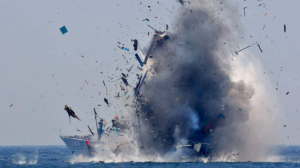
Chinese fishermen have met with opposition from the authorities for their illegal activities in the waters of Indonesia, Japan, North and South Korea and Vietnam. Attempts at arrest have often met with violence because the Chinese sailors are militarily trained, presumably because Beijing knows it’s breaking international law and realises that the police of victim nations may try to stop them. One South Korean coast guard ship was even sunk after being rammed by the Chinese vessel it was trying to apprehend. Some seventy countries around the world have signed up to the Port State Measures to Prevent, Deter, and Eliminate Illegal, Unreported and Unregulated Fishing. Unsurprisingly, they do not include China. But then a known burglar is unlikely to sign a petition calling for tougher police action against burglars.
| UNITY, LIKE CHARITY, BEGINS AT HOME
China puts great store by “unity”. “This remains by far the most important question in China’s political life,” according to Martin Jacques in his book “When China Rules the World”. But that means “unity” with other Chinese people inside China. “The fact that China has spent so much of its history in varying degrees of disunity, and at such great cost, has taught the Chinese that unity is sacrosanct”.
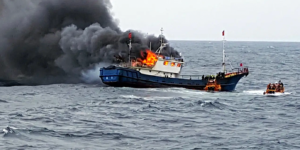
They do not, of course, respect it among other nations, nor do they care much for the views of the people concerned. “The Chinese government has attached the highest priority to the return of Hong Kong, Macao and Taiwan,” writes Jacques, “even though they passed out of Chinese Hands (in the case of Macao and Hong Kong) a very long time ago. Furthermore, little or no weight has been given to the preferences of the people who live there.” In other words, China is effectively a dictatorship. Do not try to argue against its decisions. They’re fixed and unshakeable. Xi Jinping, the general secretary of the Chinese Communist Party and chairman of the Central Military Commission, and the paramount leader of China, would probably disagree, although China’s fleet of fishing vessels often operate in the territorial waters of very poor countries, taking away the marine produce upon which local people rely for food and income. That’s why China has been described as the “major predator”. Of almost 1,000 of China’s “distant water “ vessels, half are registered in Africa, with China’s West African fleet operating outside licensed waters, under-reporting and over-harvesting their catch. In 2020, hundreds of Chinese vessels were found illegally taking sharks from waters off the Galapagos islands with their identity transponders turned off to avoid being detected.
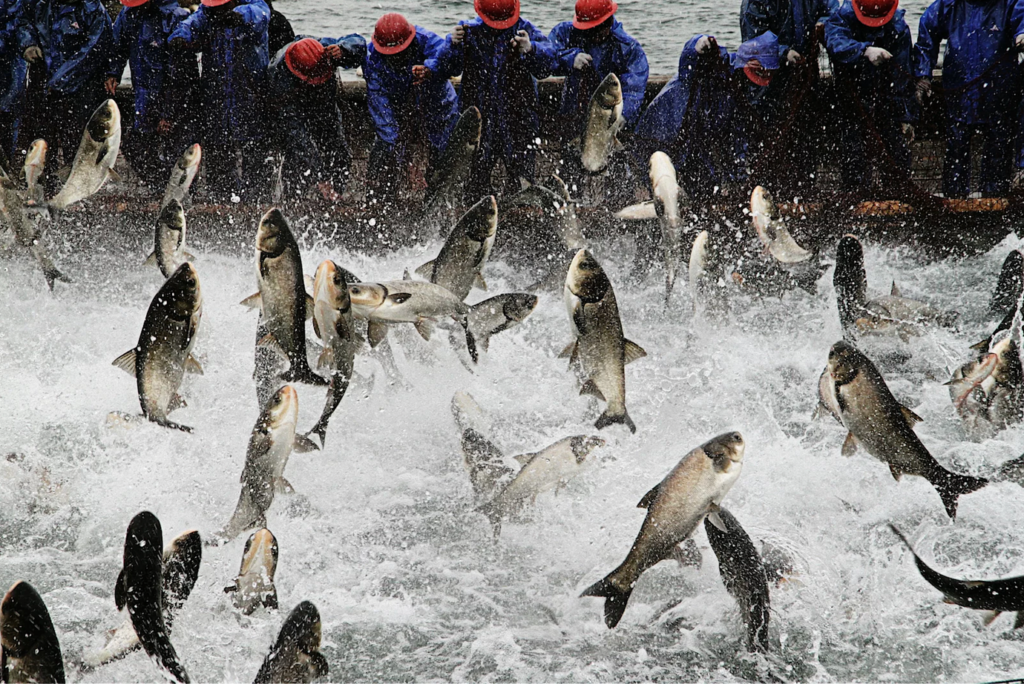
Another advantage for China is that its far-flung fishing vessels work as a kind of “maritime militia”, helping it to spread its influence far and wide. China admits that its distant-water vessels are “pseudo-military instruments”, and that their crews receive basic military training and are taught how to “safeguard Chinese sovereignty”. Does anyone remember those kung-fu films of the 1980s? In any case, armed Chinese fishing boats are frequently involved in attempts to harass vessels from other countries, rather as if China believes it has sovereign rights over all the waters of the world. The ships also relay information about the movements of other countries’ vessels. China tried to assert its sovereignty over various disputed waters, such as those off the Philippines, but despite that claim being rejected by the International Court of Arbitration, as many as hundreds of Chinese vessels have sought to occupy disputed waters (disputed but definitely not Chinese) to prevent other countries’ vessels from gaining access. China also seems to be trying to convert its distant radar stations, supposedly set up to monitor Chinese fishing activities, as military bases. China has made promises to restrain its distant-water operations, although it has shown no signs of honouring them.
China’s problem stems partly from the way it has depleted its own fish stocks so drastically. Having so few of its own fish left to catch, it is increasingly extending its range and is believed to be in possession of between 200,000 and 800,000 vessels. At the upper end, that’s almost half of all the fishing boats in the world. China admits to having some 2,600 vessels – quite a lot. But a study by the US Overseas Development Institute puts the number closer to 17,000, many of them not carrying transponders and therefore effectively invisible. Not entirely invisible, of course: satellite images revealed the higher number in North Korean waters. The United States’ own distant waters fleet numbers fewer than 300 vessels. The Chinese fleet is having to sail further and further afield to bring back its hoped-for harvest. It goes some way towards explaining the so-called “ghost boats”: badly damaged old wooden vessels that washed up along the coast of Japan, bearing the corpses of North Korean fishermen who appear to have died of starvation.

| CHINA’S TENTACLES EVERYWHERE
According to a report for the Yale School of the Environment by Ian Urbina, China is filling the waters with its own armada of industrial vessels to force out North Korean vessels, which are smaller, whilst drastically depleting the available stock of squid. Those found washed up on Japan’s coast appear to be fishermen who ventured too far out in their hunt for squid. Some experts, such as Urbina, are at last starting to link China’s expanding maritime activities with its “geopolitical aspirations”; it seems to want to rule the world. Its activities at sea are clearly helping in this regard. Attempts to police its activities are difficult because many of those working on the vessels are illiterate. This would have upset Chairman Mao Zedong because his campaign to teach literacy has made huge strides since it began in 1949. Literacy was the shining centrepiece of Mao’s plan to educate the population and “sweep away illiteracy”, as Stalin had done and was still doing in Russia. Clearly Xi is not the equal of Mao in many ways. As for policing the fleet, it’s not just the inability of many fishermen to read that gets in the way. Many of the vessels themselves are not properly licensed and also lack names or identifying numbers. China has so far refused to standardise the system or share information. It’s been reported that Chinese fishing boats are often aggressive and are frequently shadowed by armed Chinese coastguard vessels. China seems to opposes any sort of law enforcement whilst favouring using its officials as bully-boys to intimidate others. While Urbina and his researchers were trying to film the activities of the Chinese vessels, one of them veered violently off course and forced Urbina’s boat to swerve to avoid a collision. As it is, China’s fishing vessels are often referred to as a “civilian militia”, wrote Greg Poling in Foreign Policy magazine, “a non-uniformed unprofessional force without proper training and outside the frameworks of international maritime law, the military rules of engagement, or the multilateral mechanisms set up to prevent unsafe incidents at sea.” Indeed, the Chinese seem determined to cause accidents at sea, which is illegal except in times of declared war.
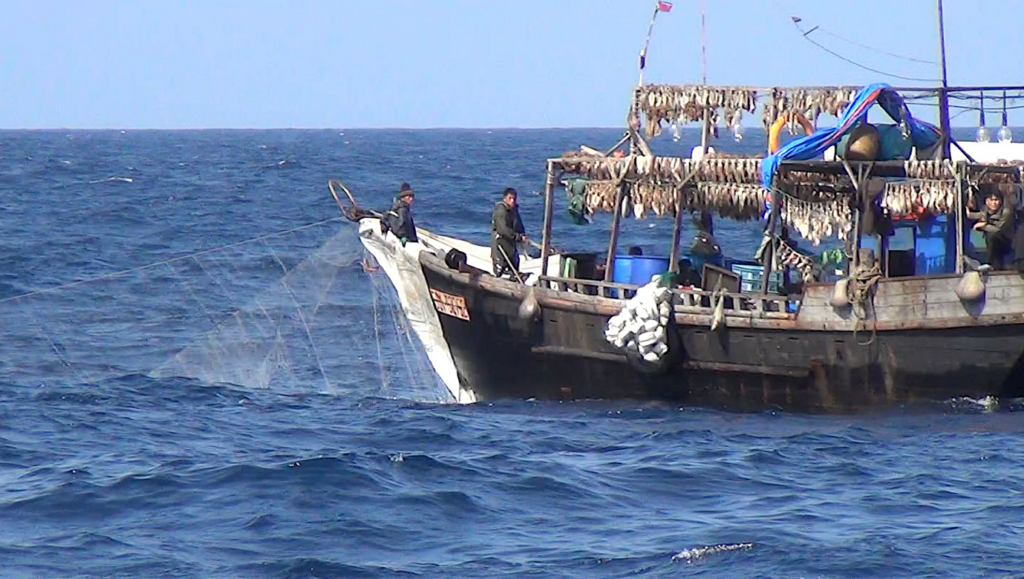
| OLD MAPS, DEEP RAVINES AND POETRY
Talking about fish should not, to the Chinese mind, inspire thoughts of war. Indeed, fishing has been a source of gentle poetical meditation for years. It was Bai Juyi, a poet working during the Tang dynasty (618–907AD) who wrote:
“Ocean water, mulberry orchards expect a change of seasons
Typhoon waves multiply to overturn and bubble away many people.
Whales swallow flood dragons, produces waves of blood
This little fish unaware of all of this inside a deep ravine.”
Or, if you prefer:
“海 水 桑 田 欲 变 时
风 涛 翻 覆 沸 天 池。
鲸 吞 蛟 斗 波 成 血
深 涧 游 鱼 乐 不 知。”
Presumably that little fish today would be actively working for the Chinese government and have little or no interest in flood dragons (whatever they are). And it may be radio-tracking any foreign vessels that might possibly be watching the Chinese boats with espionage in mind. Hiding in a deep ravine when the Chinese fleet gets near seems like a sensible idea.
Even so, tensions could be easing. According to the South China Morning Post, China and the United States have now set up joint working groups on finance and the economy after months of talks aimed at easing trade tensions.
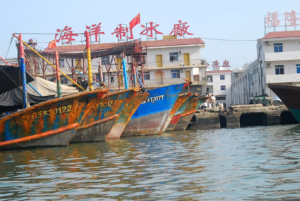
Does that include fish? The article doesn’t say. Meanwhile, China’s militarisation of the oceans continues a-pace. It has, for instance, erected artificial reefs and shoals in the waters off the Spratly Islands, a disputed archipelago in the South China Sea, composed of islands, islets, cays, and more than a hundred reefs, sometimes grouped in submerged old atolls. The archipelago lies off the coasts of the Philippines, Malaysia, and southern Vietnam but China has been militarising them with airstrips, radar facilities and harbours, while Chinese fishing boats swarm over the entire zone, crowding out and deliberately intimidating any likely competitors. Back in 2018, China suddenly sent a fleet of more than ninety fishing boats to anchor within a few nautical miles of Thitu Island, which belongs to the Philippines. This act followed a modest upgrade to the island’s infrastructure by the Philippine government. Whenever China seeks a justification for its acts of aggression, it resorts to what’s called a “nine-dash line” argument, relying (as it does) on old maps of historic fishing grounds, using a line made up of nine dashes to enclose an area of sea China argues to be part of its historic waters. It’s not a new trick: the United States and Europe have deployed similar arguments in the past, although it was said to be an invalid argument in a 2016 international court ruling.
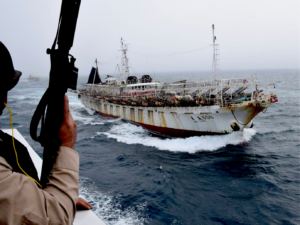
It can be hazardous in the disputed waters. In March 2016, a Chinese ship that had been ordered to stop by the Argentine Coast Guards tried to escape into international waters until the Argentinian vessel fired a warning shot, at which point the Chinese vessel attempted to ram the coast guard ship, before it was capsized for its trouble. Some of the Chinese crew swam out to other Chinese boats while others were rescued (and held) by the coastguard. It all goes to show that China is engaged in a dangerous game in which it will inevitably be portrayed as the villain, attempting illegal activities to steal the food from other (often poorer) nations.

